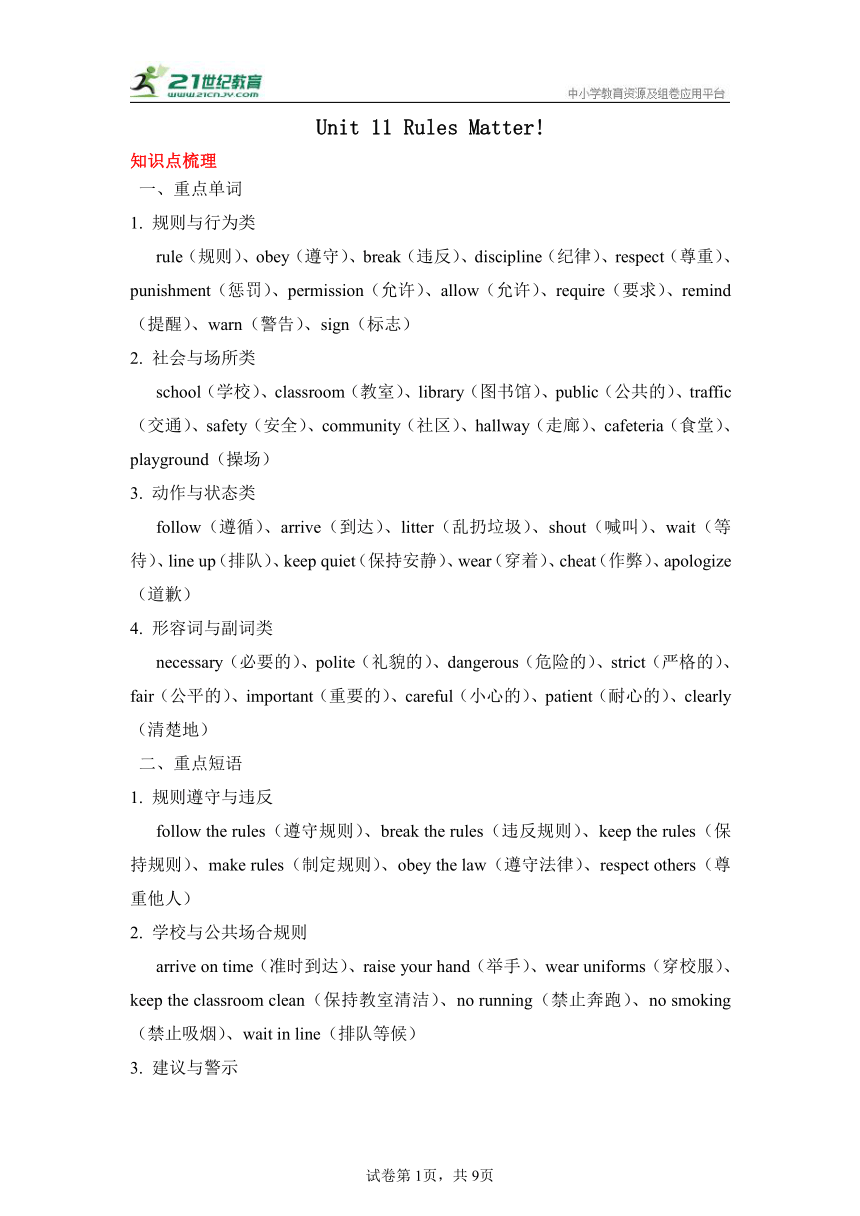
Unit 11 Rules Matter! 知识点梳理 一、重点单词 1. 规则与行为类 rule(规则)、obey(遵守)、break(违反)、discipline(纪律)、respect(尊重)、punishment(惩罚)、permission(允许)、allow(允许)、require(要求)、remind(提醒)、warn(警告)、sign(标志) 2. 社会与场所类 school(学校)、classroom(教室)、library(图书馆)、public(公共的)、traffic(交通)、safety(安全)、community(社区)、hallway(走廊)、cafeteria(食堂)、playground(操场) 3. 动作与状态类 follow(遵循)、arrive(到达)、litter(乱扔垃圾)、shout(喊叫)、wait(等待)、line up(排队)、keep quiet(保持安静)、wear(穿着)、cheat(作弊)、apologize(道歉) 4. 形容词与副词类 necessary(必要的)、polite(礼貌的)、dangerous(危险的)、strict(严格的)、fair(公平的)、important(重要的)、careful(小心的)、patient(耐心的)、clearly(清楚地) 二、重点短语 1. 规则遵守与违反 follow the rules(遵守规则)、break the rules(违反规则)、keep the rules(保持规则)、make rules(制定规则)、obey the law(遵守法律)、respect others(尊重他人) 2. 学校与公共场合规则 arrive on time(准时到达)、raise your hand(举手)、wear uniforms(穿校服)、keep the classroom clean(保持教室清洁)、no running(禁止奔跑)、no smoking(禁止吸烟)、wait in line(排队等候) 3. 建议与警示 be careful with...(小心...)、pay attention to...(注意...)、it’s forbidden to...(禁止...)、remind someone to...(提醒某人做...)、get a warning(收到警告) 三、重点句型 1. 表达规则的必要性 You must wear a helmet when riding a bike.(骑自行车时必须戴头盔。) It’s important to follow traffic lights.(遵守交通信号灯很重要。) 2. 禁止与警告 Don’t eat in the library.(不要在图书馆吃东西。) You mustn’t cheat during exams.(考试时禁止作弊。) 3. 建议与义务 We should apologize if we make mistakes.(如果我们犯错,应该道歉。) Everyone needs to keep quiet in the hospital.(在医院里每个人都需要保持安静。) 四、重点语法 1. 情态动词 must/mustn’t 的用法 结构:主语 + must/mustn’t + 动词原形 例句: Students must finish homework on time.(学生必须按时完成作业。) You mustn’t use phones in class.(课堂上禁止使用手机。) 2. 祈使句表示规则 肯定祈使句:Keep your desk tidy.(保持课桌整洁。) 否定祈使句:Don’t talk loudly.(不要大声喧哗。) 3. It’s + 形容词 + to + 动词原形 结构:It’s necessary/important/dangerous to... 例句: It’s necessary to listen to the teacher.(认真听老师讲课是必要的。) It’s dangerous to play near the road.(在马路边玩耍很危险。) 提升训练 一、单项选择 1.—Please don’t eat or drink in the library. —_____ I didn’t know that. A.It’s OK. B.Let me see. C.I’m sorry. D.Thank you. 2.I enjoyed _____ when playing basketball with my friends. A.me B.my C.mine D.myself 3.—Is this your book or _____ —It’s mine. A.her B.hers C.she D.herself 4.—Could you please tell me some table manners in China —Sure, Sally. You shouldn’t _____ others with chopsticks and ... A.knock at B.point at C.arrive at D.look at 5.It’s not _____! He always gets more pocket money than me. A.easy B.healthy C. ... ...
~~ 您好,已阅读到文档的结尾了 ~~